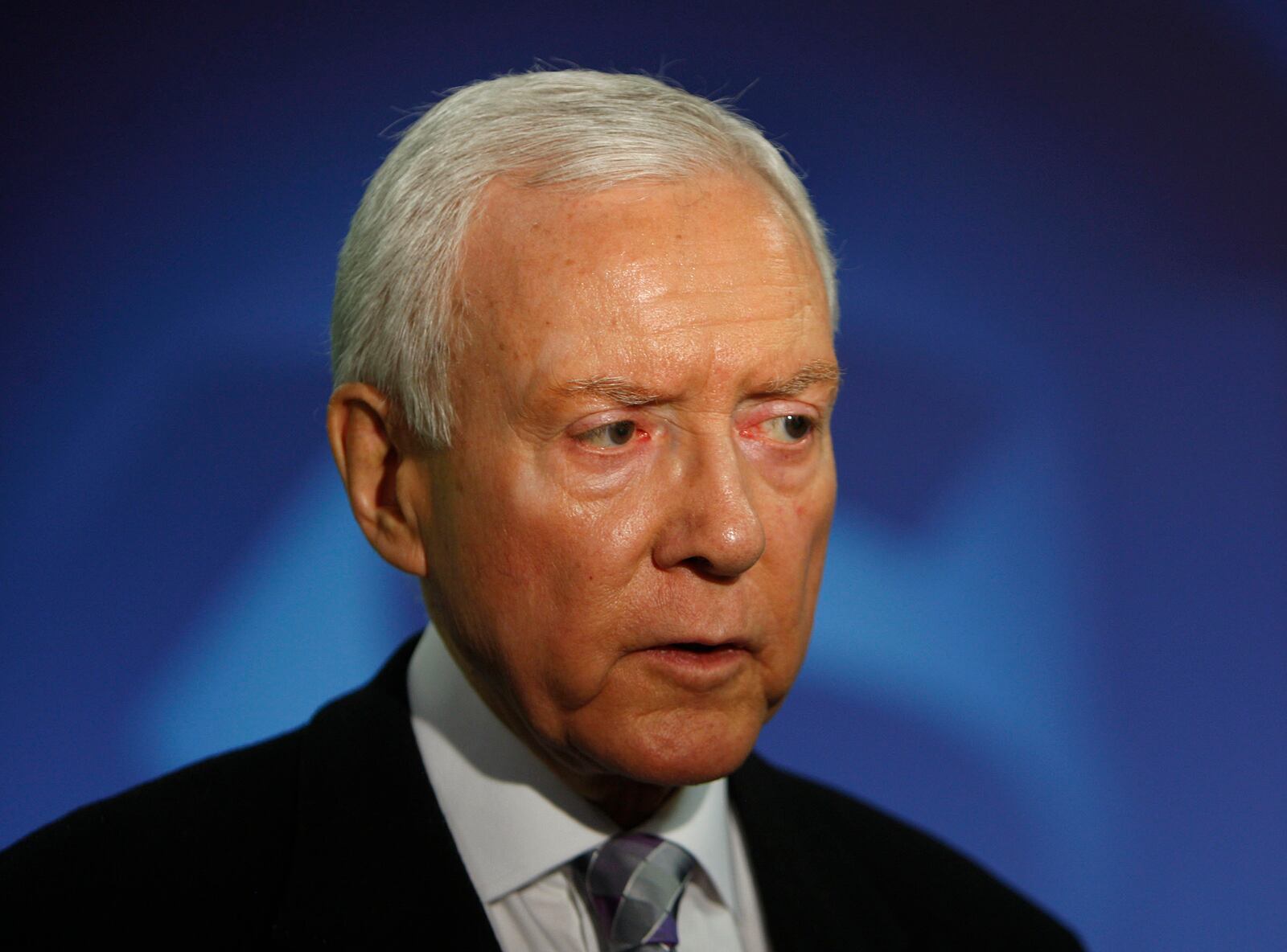 at age 88." width="800" height="592" />
at age 88." width="800" height="592" /> at age 88." width="800" height="592" />
at age 88." width="800" height="592" />
Retired Sen. Orrin Hatch, the longest-serving Republican senator in U.S. history and the longest-serving from Utah, died Saturday at age 88.
Matt Sandgren, executive director of the Hatch Foundation, said Hatch personified the American dream.
“Born the son of a carpenter and plaster lather, he overcame the poverty of his youth to become a United States senator. With the hardships of his upbringing always fresh in his mind, he made it his life’s mission to expand freedom and opportunity for others — and the results speak for themselves.”
Hatch was first elected in 1976 and served 42 years in the Senate until retiring after his seventh term in 2019.
From tax and trade to religious liberty and health care, few legislators have had a greater impact on American life than Hatch, Sandgren said.
“He was a profoundly positive influence in the lives of those he served, whether they were the constituents he helped over four decades of casework, the hundreds of interns he sponsored in both Utah and D.C., or the robust network of Hatch staffers who carry on his legacy to this day,” he said.
Scott Anderson, chairman of the Hatch Foundation, described the senator as a man of wisdom, kindness, character and compassion. Hatch, he said, “was everything a United States senator should be.”
Anderson said Hatch exemplified a generation of lawmakers brought up on the principles of comity and compromise, and he embodied those principles better than anyone.
“In a nation divided, Orrin Hatch helped show us a better way by forging meaningful friendships on both sides of the aisle. Today, more than ever, we would do well to follow his example,” he said.
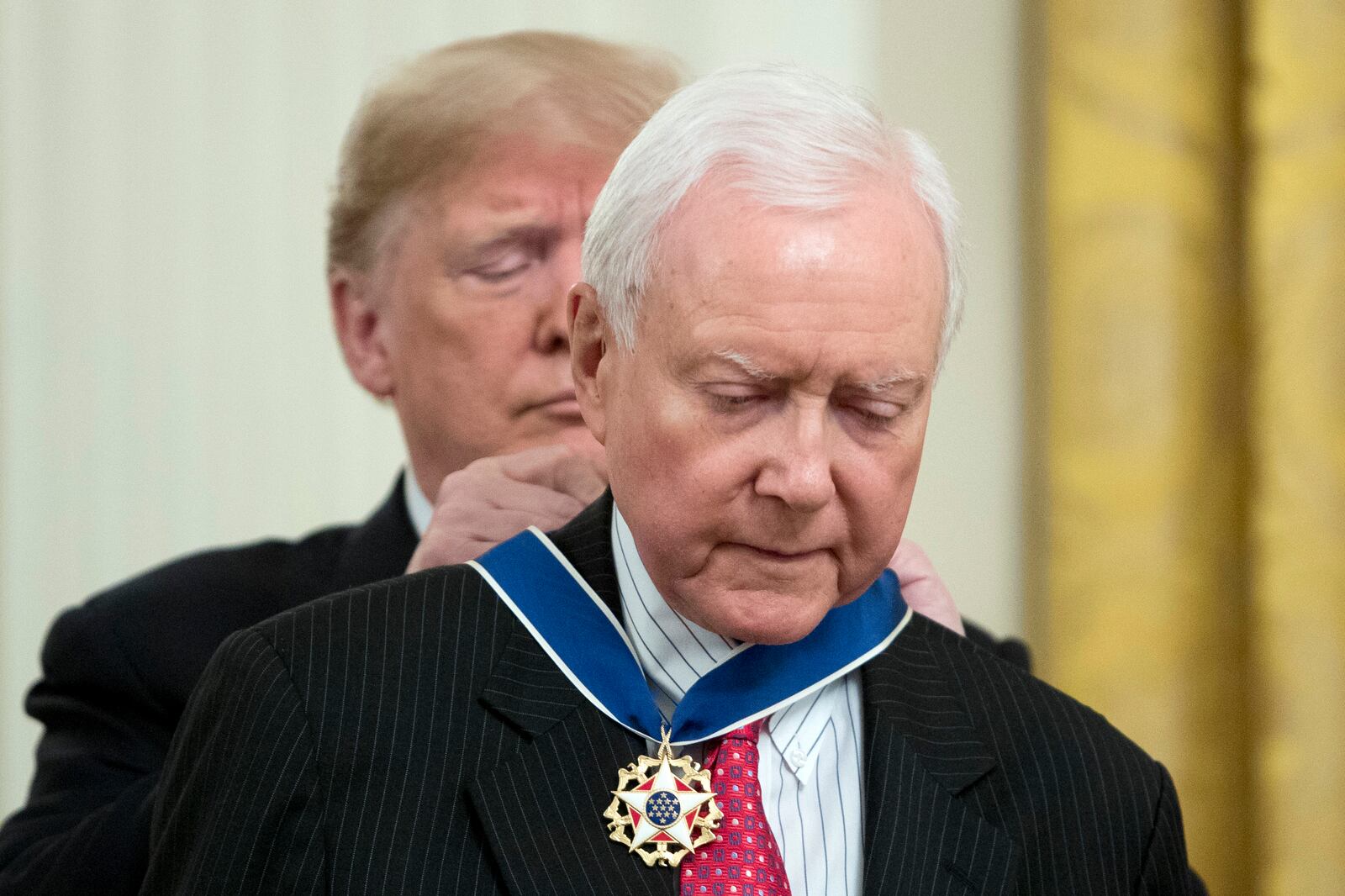
Prior to his election to the Senate in 1976, Hatch, a Salt Lake lawyer, had held no public office.
Hatch served with seven presidents — four Republicans and three Democrats — headed three committees and passed nearly 800 pieces of legislation in his time in office.
“If I was to pick one bill that I love more than anything else it’s the Religious Freedom Restoration Act. We could not pass that today,” the senator said in one of his final interviews with the Deseret News in 2018. “That has protected religious freedom like never before. It’s something you would think you wouldn’t have to protect, but believe me you have to protect it.”
The bill was one of several Hatch passed with Massachusetts Sen. Ted Kennedy, the noted “Liberal Lion of the Senate.” Hatch and Kennedy differed on virtually every issue — “we were like fighting brothers,” Hatch once said.
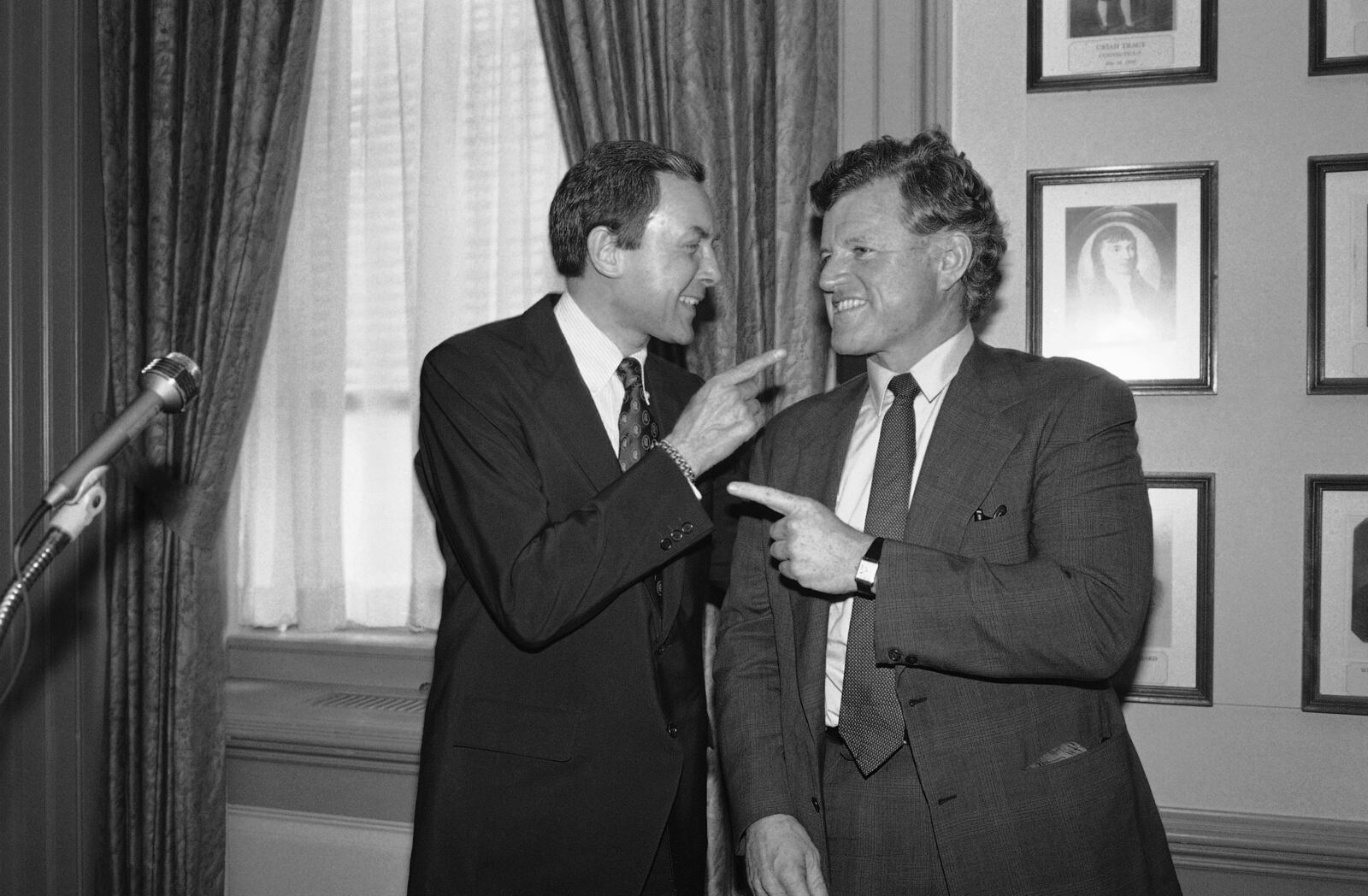
When Hatch was invited to speak at Kennedy’s funeral in 2009, he said, “I’m grateful for the late Sen. Ted Kennedy, who taught me that the bonds of friendship are stronger than any partisan pull.”
In that 2018 interview, Hatch talked about where his extensive collection of Senate papers accumulated over four decades would be housed.
“It’s no secret that the people up in Massachusetts wanted all my papers so they could put them in the Ted Kennedy Institute. I said, ‘No way,’” he said.
Washington’s odd couple — Hatch the Utah conservative, Kennedy the Massachusetts liberal — argued, compromised and passed many laws while becoming the unexpected best of friends.
“Most of the social legislation that works in this country came during those years that Kennedy was working with me,” Hatch said. “He could never have passed those things by himself, and neither could I.”
Other consequential bills he championed include the Drug Price Competition and Patent Term Restoration Act that created the modern generic drug industry; the State Children’s Health Insurance Program, ensuring health care for uninsured minors; the Americans with Disabilities Act, prohibiting discrimination against persons with disabilities; the Missing and Exploited Children Act that established the National Center for Missing and Exploited Children; the Comprehensive Smoking Education Act, requiring cigarette packaging to carry health warnings; and the Music Modernization Act, which overhauled copyright laws.
A political outsider, the 42-year-old Pittsburgh transplant entered the race as a dark horse for the Republican nomination to oppose three-term incumbent Democratic Sen. Frank E. Moss, filing his candidacy five minutes before the deadline.
His campaign was based on the guiding principles of limited government, tax restraint and integrity in public service. He went on to defeat Moss, who many said could not be beaten, with 54% of the vote.
Hatch ran an abbreviated campaign for president in 1999. After finishing last in the Iowa caucuses in January 2000, he withdrew and endorsed eventual winner George W. Bush.
In January 2015, after the 114th Congress Hatch was sworn in, Hatch became president pro tempore of the Senate — first in senate seniority and third in line for the presidency — until his retirement in 2019.
Hatch considered running for an eighth term in the Senate at the urging of then-President Donald Trump, whom he steadfastly supported. Health issues, failing eyesight in particular, caused Hatch to decide not to run.
He announced his decision in his longtime Senate office wearing a pair of blue boxing gloves. “I was an amateur boxer in my youth,” he said, “and I’ve brought that fighting spirit with me to Washington. But every good fighter knows when to hang up the gloves.”
After Hatch announced his retirement, Republican Mitt Romney ran for and won the seat.
Hatch was instrumental in bringing Trump to Utah in December 2017 where the president signed an executive order slashing the sizes of Bears Ears and Grand Staircase-Escalante national monuments. President Joe Biden has since restored the monuments to their original sizes.
In a statement Saturday, Trump called Hatch a “true warrior for our country, for liberty and for his beloved state of Utah.”
“He was as wise as he was kind, and as tough as he was smart — he loved America and his contributions to our country were tremendous,” Trump said. “His legacy will surely live on through the many lives he impacted. May God bless Orrin Hatch.”
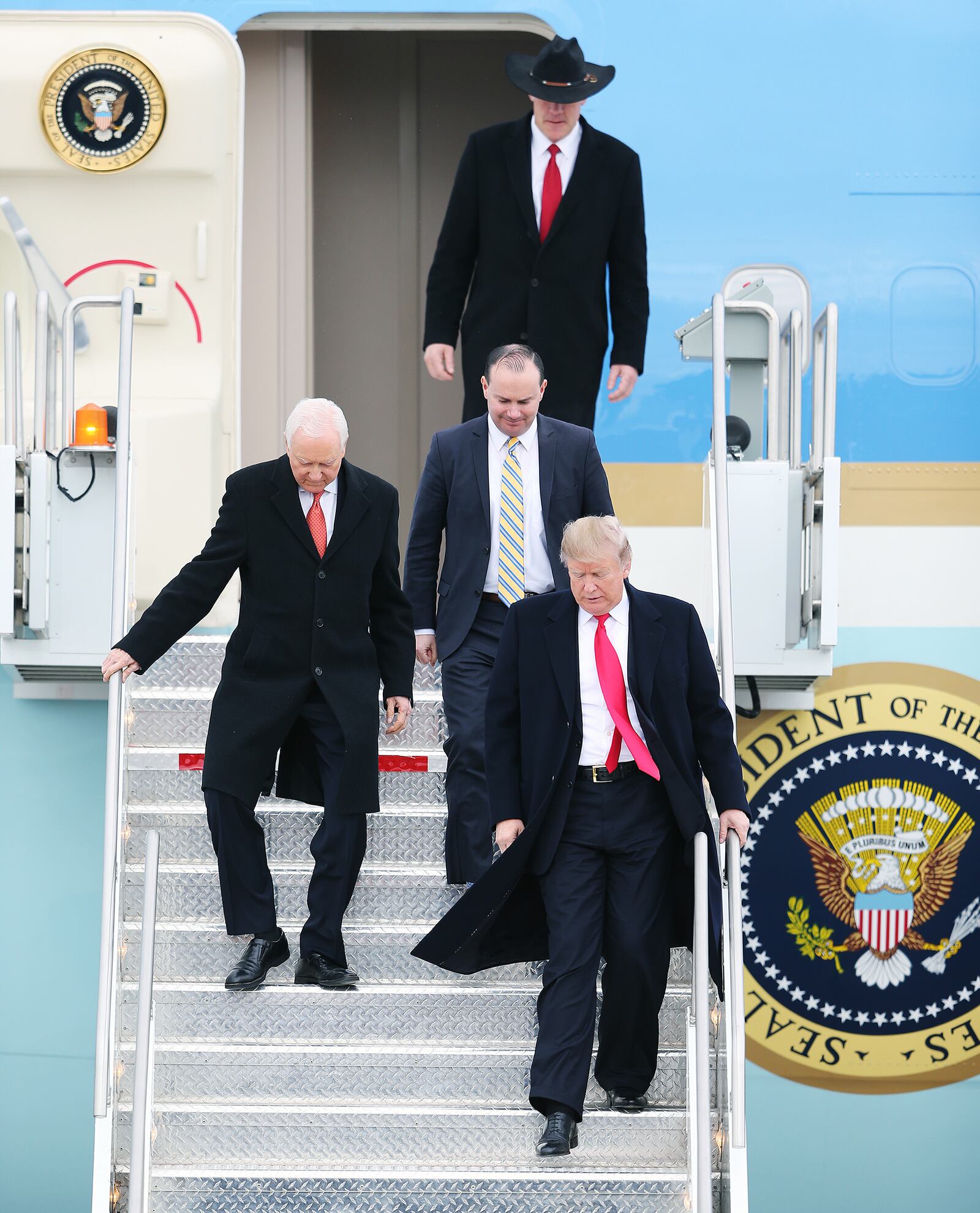
An avowed workaholic and relentless crusader, Hatch played a significant role in shaping the Supreme Court and the federal judiciary. He participated in the confirmation of more than half of all federal judges who had ever served since the country’s origin and played a central role in 15 Supreme Court confirmation hearings. He was on a short list for Supreme Court consideration during the Reagan administration.
Hatch drew national attention for his dogged support during contentious confirmation hearings for conservative nominees Clarence Thomas in 1991 and Brett Kavanaugh in 2018, both of whom were confirmed.
As of 2021, the federal courthouse in Salt Lake City has borne Hatch’s name. Trump presented Hatch with the Presidential Medal of Freedom, the highest honor the nation reserves for a citizen.
“This news came as a complete surprise to me, and I understand that many of my friends, both here in Utah and across the country, went to great lengths to make it happen,” he said then. “As one of the longest-serving members in the history of the Senate Judiciary Committee, I made it my life’s legacy to defend the rule of law and the integrity of our courts.”
During his time in Washington, Hatch was targeted by liberals, often resulting in strong Democratic efforts from outside the state to unseat him. None were successful.
“He was, quite simply, an American original,” Biden said in a statement Sunday.
Hatch, he said, once shared in an interview that he had a soft side and a tough side.
“To serve with Orrin, as I did for over three decades, was to see — and appreciate — both,” the president said.
“I saw that energetic, sharp-elbowed Orrin in the many battles we had over tax policy, the right of workers to join a union, and many others,” Biden said. “At the same time, Sen. Hatch was also a man of deep faith.”
When Biden cast his 10,000th vote in the Senate, he and Hatch spoke on the Senate floor.
“I said that the greatest perk one has as a senator was access to people with serious minds, a serious sense of purpose, and who cared about something. That was Orrin,” he said.
The National Taxpayers’ Union recognized Hatch for his fiscal responsibility and was dubbed by others “Mr. Free Enterprise,” “Guardian of Small Business,” and “Mr. Constitution.”
He served as chairman of the Senate Judiciary Committee, the Senate Finance Committee and the Health, Education, Labor and Pensions Committee. He was also a member of the Senate Intelligence Committee, the Committee on Indian Affairs, the Special Committee on Aging, and the Joint Economic Committee.
Hatch also had the honor of serving on the board of directors for the Holocaust Memorial Museum in Washington, D.C.
He received five honorary doctorate degrees from law schools and universities.
Operations Kids honored Hatch in 2004 with its Lifetime Achievement Award. Celebrities like Donny Osmond, Larry King, former California Gov. Arnold Schwarzenegger, Steve Young and others honored him at a gala event for that recognition.
Born March 22, 1934, in Pittsburgh, Pa., his great-grandfather, Jeremiah Hatch, founded the Utah town of Vernal, in 1878.
At 6-foot-2 inches tall, sports were a big part of his young life, playing basketball and boxing. He was captain of his high school basketball team and turned down a college scholarship back East in favor of attending BYU. At BYU, his intramural basketball team won top school honors.
Hatch also had a passion for music. He learned to play the piano, organ and violin.
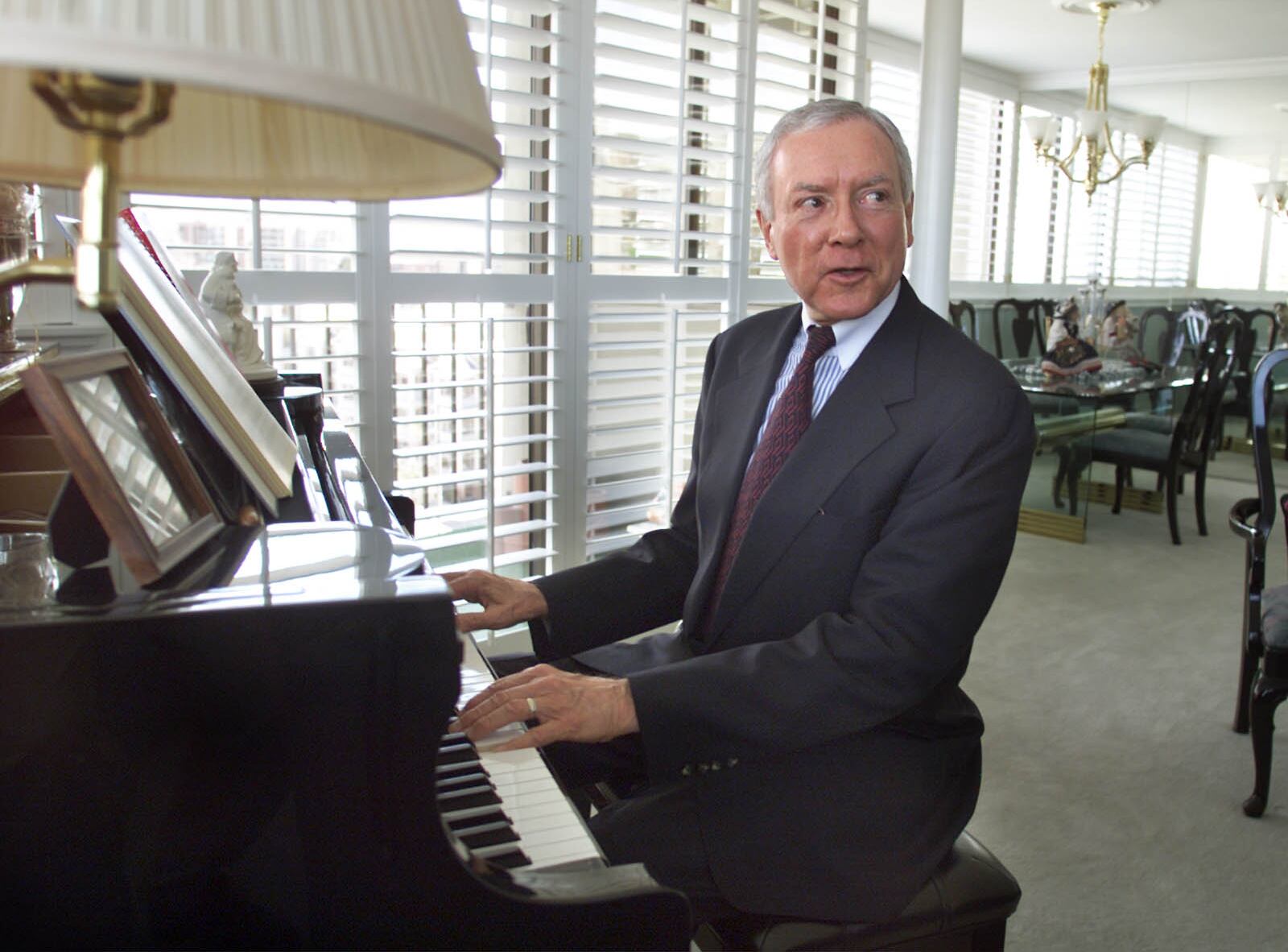
At times, he was referred to as the “songwriting U.S. senator.” He co-wrote “Unspoken,” which was recorded by Jaci Velasquez and was chosen for “WOW Hits 2005,” a compilation of Christian pop music and sold more than 1 million copies, earning Hatch his first gold and platinum album.
“Some people who don’t ever listen to my music, they just can’t imagine how a senator can write music. They just write it off as a gimmick, but I think that says it’s no gimmick,” he told the Deseret News in 2006.
He wrote “Unspoken” with Madeline Stone and Toby Gad.
In the 1980s, Hatch added Muhammad Ali to his eclectic coterie of friends. The boxing great took a liking to Hatch after a friend of Ali’s was confirmed to a federal post and thereafter championed the senator’s causes, including coming to Utah to campaign for him in the 1988 election.
“He’s a nice fella. And he fights for what he believes in,” said Ali. As with Kennedy, Hatch was asked to speak at Ali’s funeral.
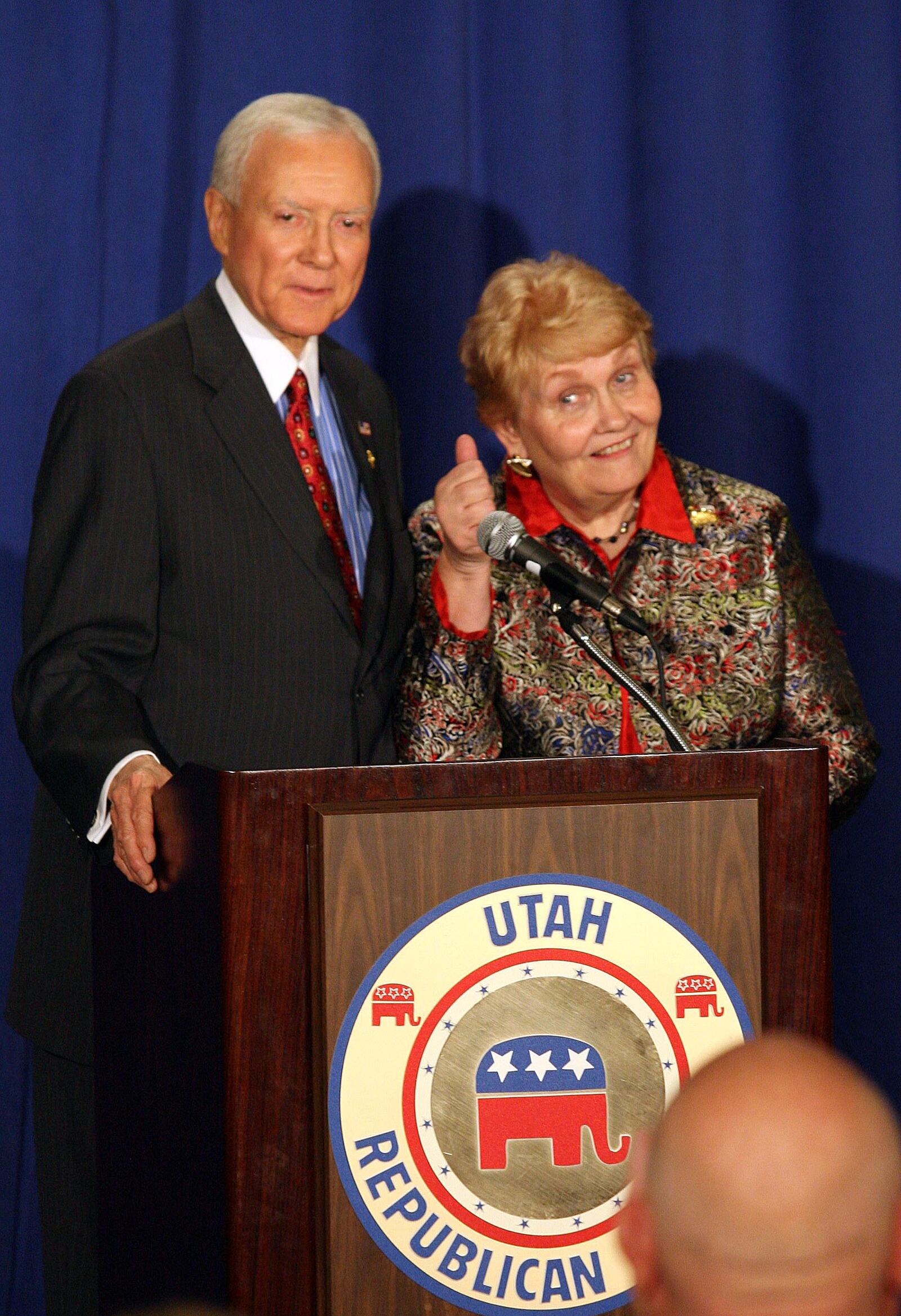
At his high school in Pittsburgh, he was elected to the student Senate, and later as student body president.
As a young man, Hatch learned the metal lathing trade, like his father and was a card-carrying member of the AFL-CIO. He worked his way through college at BYU, graduating in 1959 with a degree in history.
View CommentsHe was awarded a full honors scholarship to the University of Pittsburgh Law School. As a law student, he worked as a janitor, a metal lather and at night, as a gas station attendant and even as an all-night desk attendant in a girls dormitory. In 1962, he received his Juris Doctor, graduating with honors.
After receiving his law degree, Hatch was a practicing attorney, first in Pennsylvania then in Utah, until his election to the U.S. Senate in 1976.
Hatch served a mission for The Church of Jesus Christ of Latter-day Saints in 1954 to the Great Lakes. He also later served as bishop for the East Mill Creek 10th Ward and also on a stake high council. He was also a guide on Salt Lake City’s Temple Square for a brief time.
He married the former Elaine Hansen of Newton, Cache County, on Aug. 28, 1957. The two met in a BYU astronomy class. They have six children.